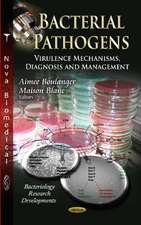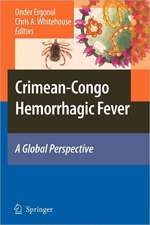Human Antibody Therapeutics For Viral Disease: Current Topics in Microbiology and Immunology, cartea 317
Editat de Scott K. Dessainen Limba Engleză Hardback – 12 oct 2007
| Toate formatele și edițiile | Preț | Express |
|---|---|---|
| Paperback (1) | 777.04 lei 38-45 zile | |
| Springer Berlin, Heidelberg – 30 noi 2010 | 777.04 lei 38-45 zile | |
| Hardback (1) | 944.51 lei 6-8 săpt. | |
| Springer Berlin, Heidelberg – 12 oct 2007 | 944.51 lei 6-8 săpt. |
Din seria Current Topics in Microbiology and Immunology
- 18%
 Preț: 962.03 lei
Preț: 962.03 lei - 5%
 Preț: 1123.13 lei
Preț: 1123.13 lei -
 Preț: 499.76 lei
Preț: 499.76 lei - 5%
 Preț: 967.79 lei
Preț: 967.79 lei - 18%
 Preț: 1118.62 lei
Preț: 1118.62 lei - 5%
 Preț: 717.00 lei
Preț: 717.00 lei - 5%
 Preț: 712.97 lei
Preț: 712.97 lei - 5%
 Preț: 709.51 lei
Preț: 709.51 lei - 5%
 Preț: 709.51 lei
Preț: 709.51 lei - 5%
 Preț: 721.19 lei
Preț: 721.19 lei - 5%
 Preț: 359.78 lei
Preț: 359.78 lei - 5%
 Preț: 711.88 lei
Preț: 711.88 lei - 5%
 Preț: 774.81 lei
Preț: 774.81 lei - 15%
 Preț: 640.06 lei
Preț: 640.06 lei - 5%
 Preț: 717.00 lei
Preț: 717.00 lei - 5%
 Preț: 360.34 lei
Preț: 360.34 lei - 5%
 Preț: 707.69 lei
Preț: 707.69 lei - 5%
 Preț: 717.56 lei
Preț: 717.56 lei - 5%
 Preț: 716.28 lei
Preț: 716.28 lei - 5%
 Preț: 717.20 lei
Preț: 717.20 lei - 5%
 Preț: 711.32 lei
Preț: 711.32 lei - 5%
 Preț: 711.88 lei
Preț: 711.88 lei - 5%
 Preț: 718.29 lei
Preț: 718.29 lei - 5%
 Preț: 709.51 lei
Preț: 709.51 lei - 5%
 Preț: 369.84 lei
Preț: 369.84 lei - 5%
 Preț: 712.25 lei
Preț: 712.25 lei - 5%
 Preț: 716.45 lei
Preț: 716.45 lei - 5%
 Preț: 706.60 lei
Preț: 706.60 lei - 5%
 Preț: 711.52 lei
Preț: 711.52 lei - 5%
 Preț: 713.54 lei
Preț: 713.54 lei - 5%
 Preț: 720.47 lei
Preț: 720.47 lei - 5%
 Preț: 725.42 lei
Preț: 725.42 lei - 5%
 Preț: 708.06 lei
Preț: 708.06 lei - 5%
 Preț: 713.70 lei
Preț: 713.70 lei - 5%
 Preț: 705.83 lei
Preț: 705.83 lei - 5%
 Preț: 710.96 lei
Preț: 710.96 lei - 5%
 Preț: 723.93 lei
Preț: 723.93 lei - 5%
 Preț: 707.69 lei
Preț: 707.69 lei - 5%
 Preț: 715.35 lei
Preț: 715.35 lei - 5%
 Preț: 709.87 lei
Preț: 709.87 lei - 5%
 Preț: 359.05 lei
Preț: 359.05 lei - 5%
 Preț: 374.20 lei
Preț: 374.20 lei - 15%
 Preț: 635.31 lei
Preț: 635.31 lei - 5%
 Preț: 707.86 lei
Preț: 707.86 lei - 5%
 Preț: 721.96 lei
Preț: 721.96 lei - 15%
 Preț: 632.88 lei
Preț: 632.88 lei - 15%
 Preț: 632.05 lei
Preț: 632.05 lei - 15%
 Preț: 642.83 lei
Preț: 642.83 lei - 5%
 Preț: 709.14 lei
Preț: 709.14 lei
Preț: 944.51 lei
Preț vechi: 1151.84 lei
-18% Nou
Puncte Express: 1417
Preț estimativ în valută:
180.75€ • 188.47$ • 150.22£
180.75€ • 188.47$ • 150.22£
Carte tipărită la comandă
Livrare economică 21 martie-04 aprilie
Preluare comenzi: 021 569.72.76
Specificații
ISBN-13: 9783540721444
ISBN-10: 3540721444
Pagini: 205
Ilustrații: XII, 190 p. 18 illus., 7 illus. in color.
Dimensiuni: 155 x 235 x 17 mm
Greutate: 0.42 kg
Ediția:2008
Editura: Springer Berlin, Heidelberg
Colecția Springer
Seria Current Topics in Microbiology and Immunology
Locul publicării:Berlin, Heidelberg, Germany
ISBN-10: 3540721444
Pagini: 205
Ilustrații: XII, 190 p. 18 illus., 7 illus. in color.
Dimensiuni: 155 x 235 x 17 mm
Greutate: 0.42 kg
Ediția:2008
Editura: Springer Berlin, Heidelberg
Colecția Springer
Seria Current Topics in Microbiology and Immunology
Locul publicării:Berlin, Heidelberg, Germany
Public țintă
ResearchCuprins
Therapeutic Control of Hepatitis C Virus: The Role of Neutralizing Monoclonal Antibodies.- Antibodies for HIV Treatment and Prevention: Window of Opportunity?.- Human Monoclonal Antibody and Vaccine Approaches to Prevent Human Rabies.- Immunoprophylaxis of RSV Infection: Advancing from RSV-IGIV to Palivizumab and Motavizumab.- The Molecular Basis of Antibody Protection Against West Nile Virus.- Exploring the Native Human Antibody Repertoire to Create Antiviral Therapeutics.
Recenzii
From the reviews:
"The articles in this book focus on the use of antibodies for the treatment of viral infectious diseases. … The book is written for anyone who has an interest in vaccine development. An advanced graduate student would have no trouble understanding this information. … For anyone interested in antibody therapeutics for viral diseases, this would be a useful book. The chapters are well written and detailed. The bibliography for each chapter is extensive. It would be a welcome addition to a department or school library." (Marion C. Cohen, Doody’s Review Service, July, 2008)
"The articles in this book focus on the use of antibodies for the treatment of viral infectious diseases. … The book is written for anyone who has an interest in vaccine development. An advanced graduate student would have no trouble understanding this information. … For anyone interested in antibody therapeutics for viral diseases, this would be a useful book. The chapters are well written and detailed. The bibliography for each chapter is extensive. It would be a welcome addition to a department or school library." (Marion C. Cohen, Doody’s Review Service, July, 2008)
Textul de pe ultima copertă
The articles in this volume have been selected to demonstrate the progress in the development of human antibody therapeutics for viral disease. Keck et al. review the nature of the immune response to the Hepatitis C virus (HCV) and the details of viral neutralization by antibodies, providing a conceptual model for the clinical use of HCV-specific antibodies. Huber et al. summarize the initial clinical experiences with antibody therapeutics for Human Immunodeficiency Virus that can be targeted to either the HIV virion or to host cell proteins. A discussion of the breadth immune strategies that is required to control human rabies is provided by Nagarajan et al., with a particular focus on India and other countries in which rabies is endemic. The development of pavilizumab for RSV prophylaxis is reviewed in Wu et al., in addition to results of antibody optimization studies that provide surprising insights and have broad general implications for anti-viral antibody engineering. Melhop and Diamond explicate the biology of West Nile Virus as a general model for flaviviruses, while using their cloned antibodies as a springboard to consider the mechanisms of WNV neutralization. The volume concludes with a description of methods to clone human antibodies in their native configurations, which access a class of antibodies that differ from those obtained by recombinant DNA or transgenic mouse methods.
The articles in this volume are definitive and comprehensive reviews written by experts who have sought to define the principles of viral neutralization by human antibodies. They explore and anticipate the obstacles and opportunities that will be encountered as the power of human antibodies is harnessed to address the vast, un-met need for effective anti-viral therapeutics.
The articles in this volume are definitive and comprehensive reviews written by experts who have sought to define the principles of viral neutralization by human antibodies. They explore and anticipate the obstacles and opportunities that will be encountered as the power of human antibodies is harnessed to address the vast, un-met need for effective anti-viral therapeutics.
Caracteristici
Includes supplementary material: sn.pub/extras










